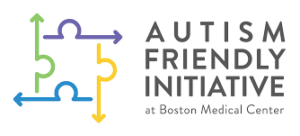Boston Medical Center Autism Friendly Initiative Healthcare Social Stories

The Boston Medical Center (BMC) Autism Friendly Initiative (AFI) is committed to improving the healthcare experience for patients with Autism Spectrum Disorder (ASD) and their families. We recognize that despite higher rates of overall healthcare utilization, autistic individuals are actually less likely to access key elements of their healthcare as compared to the neurotypical population.1,2 In addition, autistic individuals and their families are also more likely to report lower satisfaction with the care that they have received.3-5 In order to learn more about the specific challenges that face autistic patients when they seek healthcare, the BMC AFI conducted a multifaceted needs assessment throughout 2017 and 2018. The results of this needs assessment indicate that there are three main domains of challenge that face our patients and their clinicians:
• Communication Challenges: how our patients and their clinicians communicate with one another
• Sensory Challenges: how the hospital or healthcare environment can exacerbate or overwhelm sensory sensitivities
• Gaps in Knowledge: how much, or how little, clinicians feels prepared, confident, and familiar in providing high-quality care to their autistic patients
After the needs assessment was completed, the BMC AFI developed a model centered on four areas of focus. These areas of focus include:
• Individualized Care
• Visit Preparation
• Sensory Accommodations
• Education & Training
The BMC AFI understands how crucial “social stories” can be in helping individuals with autism become more comfortable with engaging in a new or unfamiliar encounter. Social stories are evidence-based, written tools that break down complex situations into simple, step-by-step narratives, and can be tailored to meet the individual needs of the reader.6 As such, social stories have always been included in how BMC AFI works to implement “visit preparation” techniques across our medical campus, and beyond.
In order to promote equitable, no-cost access to healthcare-oriented social stories for anyone around the globe, BMC AFI released our “Healthcare Social Stories” website, found here: https://bmcautismfriendly.github.io/socialstories/. This website was built by a team of BMC Autism Program interns with backgrounds in technology. Interns work each semester on developing new social story topics, in partnership with hospital clinicians and staff, who provide content expertise. BMC AFI also leverages the individual linguistic talents of all interns, who assist in routinely translating these social stories. Currently, our Healthcare Social Stories are available in English, Spanish, Portuguese, and Korean. Mandarin and Vietnamese translations are in-progress and set to be uploaded by Summer 2022.
The BMC AFI hopes that these social stories can help patients more adeptly navigate healthcare procedures that might otherwise feel too overwhelming or frustrating. Navigating, and completing, these procedures can promote greater wellness in a population that has historically been less likely to access key components of their care, and feel less satisfied with care received. The BMC AFI strives for a world in which healthcare practices understand how to provide exceptional care to any patient who walks through their doors: access to Healthcare Social Stories is one step in the right direction.
Alexander Friedman, MPH
Program Manager, Division of Developmental & Behavioral Pediatrics
Boston Medical Center
2022
For more information, contact: autismfriendly@bmc.org
References
1. Cummings JR, Lynch FL, Rust KC, et al. Health services utilization among children with and without autism spectrum disorders. Journal of Autism and Developmental Disorders. 2016;46(3):910-920. doi:10.1007/s10803-015-2634-z
2. Roux AM, Rast JE, Anderson KA, Shattuck PT. National Autism Indicators Report: Developmental Disability Services and Outcomes in Adulthood. Life Course Outcomes Program, A.J. Drexel Autism Institute, Drexel University; 2017. Accessed January 29, 2020. https://drexel.edu/autismoutcomes/publications-and-reports/publications/National-Autism-Indicators-Report-Developmental-Disability-Services-and-Outcomes-in-Adulthood/
3. Davignon MN, Friedlaender E, Cronholm PF, Paciotti B, Levy SE. Parent and provider perspectives on procedural care for children with autism spectrum disorders. Journal of Developmental & Behavioral Pediatrics. 2014;35(3):207-215. doi:10.1097/DBP.0000000000000036
4. Muskat B, Burnham Riosa P, Nicholas DB, Roberts W, Stoddart KP, Zwaigenbaum L. Autism comes to the hospital: The experiences of patients with autism spectrum disorder, their parents and health-care providers at two Canadian paediatric hospitals. Autism. 2015;19(4):482-490. doi:10.1177/1362361314531341
5. Vohra R, Madhavan S, Sambamoorthi U, St Peter C. Access to services, quality of care, and family impact for children with autism, other developmental disabilities, and other mental health conditions. Autism. 2014;18(7):815-826. doi:10.1177/1362361313512902
6. Collet-Klingenberg L, Franzone E. Overview of social narratives. The National Professional Development Center on Autism Spectrum Disorders, Waisman Center, University of Wisconsin; 2008. Accessed February 18 2022. https://csesa.fpg.unc.edu/sites/csesa.fpg.unc.edu/files/ebpbriefs/SocialNarratives_Overview_0.pdf
The views expressed in this paper are those of the author(s) and do not necessarily represent the views of the NLM Family Foundation.
